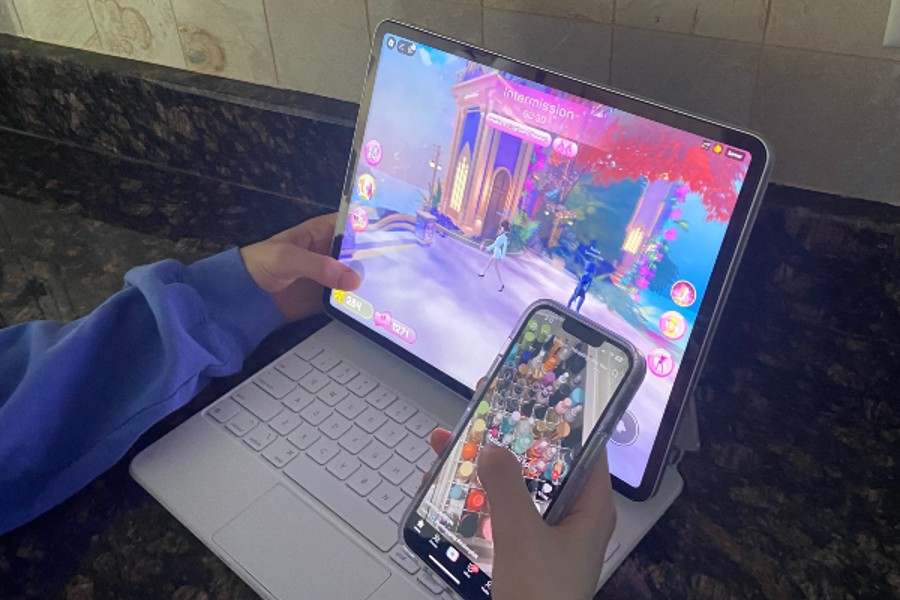Eyes glazed over, a little girl holds a phone close to her face as she swipes through Youtube short after Youtube short. The short videos, accompanied by fast paced music, range from makeup tutorials, to bizarre challenges, to funny cartoon characters doing weird dances. With each finger swipe, a plethora of stimulus seeps through the screen; the decision of whether to continue watching, or simply move on, is made in the span of 12 seconds.
Seeing children with iPads in their hands not long after birth, their eyes enamored by the colorful, fast paced world of short videos and video games, is a regular sight. All over social media, Generation Z and older generations have been complaining about these “iPad kids”, who are so completely immersed in technology it has become practically impossible for them to break away. But while Generation Alpha’s obsession with iPads and brain rot slang seems to have become just another topic of discussion for older generations, the rise of iPads kids has a much more serious implication: staring at screens at too early an age can have severe psychological effects on children at the most vulnerable point of their lives.
Looking at the world around us, it is easy to see how much technology has shaped the way we go about our lives. This technology that gives us immediate pleasure, a quick break from the stress surrounding us, has become a method of escape. But for young kids who are still learning how to communicate and interact with the world around them, having this kind of escape can be particularly harmful.
According to behavioral pediatrics expert Dr. Jennifer Cross, excessive screen time at an early age keeps children from using their imagination by playing with toys, as well as hindering their observational skills and ability to socialize. These basic life skills, which can be so important for adulthood, can deeply affect kids in the future if they are not developed correctly. Even more shocking is a 2018 study by the National Institute of Health (NIH), which shows that kids who spent more than seven hours a day on their screens experienced a premature thinning of the cortex, the part of the brain responsible for processing sensory information, while kids who spent more than two hours a day on their screens scored lower on thinking and language tests.
While these studies seem like just another statistic preaching the harmfulness of screen time, I can’t help but look back to the times I have seen these effects firsthand. Anytime I have gone out to eat with family friends who have young children, I have frequently noticed the children’s reliance on devices, their eyes permanently attached to their screens once they finish eating, unresponsive to the conversations around them that they quickly find boring. While it is understandable how helpful having that distraction can be for parents who just want to have a relaxing dinner without their kids causing trouble, having an iPad or phone at the dinner table has become so common, that it has taken the place of parenting in many ways. Though parents often use the phone as a way to keep their kids from feeling bored and acting out, I can’t help but wonder, is being bored really so bad?
Though boredom is, without a doubt, an unpleasant feeling, it can be a necessary part of life, especially for kids who are still developing. When bored and left with utterly nothing else to do, kids at the dinner table would have no choice but to either listen and observe the people around them, or find their own activity to do, like doodling. Instead of watching the iPad passively, kids would have to engage their brains, fueling their creativity and problem solving skills. According to Cross, though iPads can do wonders to quiet a crying child, parents should instead work with their children to solve the problems they are encountering.
Looking back to my own childhood, I remember the times I’d spend watching a particularly interesting episode of Dora the Explorer or Masha and the Bear. Though I myself never played video games, I’d frequently listen to the conversations my friends had about Minecraft. I realize that limiting screen time entirely is not reasonable, as there are many benefits of allowing kids to watch cartoons, especially when they are educational and watched alongside a family member or a friend with whom to discuss the silly adventures and to laugh with. Even video games like Minecraft can fuel kids’ problem solving skills and provide opportunities for socialization with family and friends.
However, with the recent rise of short videos on platforms like TikTok, YouTube shorts, and Instagram reels, the definition of “screen time” has evolved to include content that offers little engagement. These videos, which last mere seconds, provide viewers with instant feelings of reward, producing bursts of dopamine that only fuel their addiction to short content, in turn lowering their attention spans. While people of all ages are now surrounded by this kind of content, the effect of short videos is particular detrimental to growing children. For children who are exposed to this constant stimulation, their neural pathways can grow so accustomed to it, that it can become difficult for them to engage in activities that require more direct attention due to the lack of instant gratification.
In the classroom, short attention spans can keep students from fully immersing themselves in the content they are learning. Their brain’s constant switching back and forth between content leads to difficulty focusing over a long period of time. The effect of devices on kids’ learning has given rise to Yondr pouches, both nationally and locally. These pouches, designed to lock students’ phones throughout the entire day, have made their way to Blanchard and Stony Brook Middle School. While phones have not yet infiltrated the elementary school classrooms in such a large scope, it is clear that kids are becoming addicted to phones earlier and earlier, given this recent policy change at the middle school level.
“I definitely see a big distraction with cell phones,” Stony Brook eighth grade math teacher Tricia Craig said. “I definitely think it’s more significant over the last several years, when more kids have phones at younger ages, and they have so much access to social media right away.”
While pulling away from technology can be difficult for school aged children, given the peer pressure that comes with following the latest trends, this peer pressure does not yet have as extreme a hold on toddlers and young elementary school children. Parents still have the ability to steer their children, especially their young children, in the right direction. Keeping kids off of their devices during time with family and friends, as well as taking care to avoid short video content, and instead watching educational cartoons, are all ways kids can still enjoy screen time.
In a world where technology seems to evolve year after year, it is important to note that every generation will likely be more influenced by technology than the previous ones. However, it is up to parents to ensure their kids are being exposed to content that will help their brains develop and grow in the best way possible.








